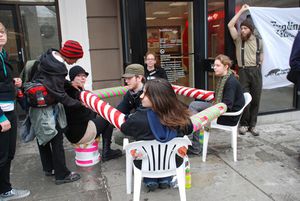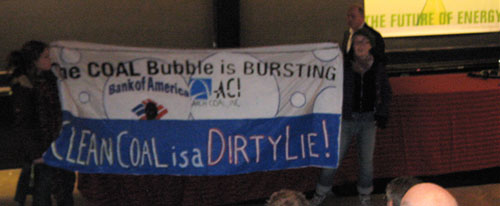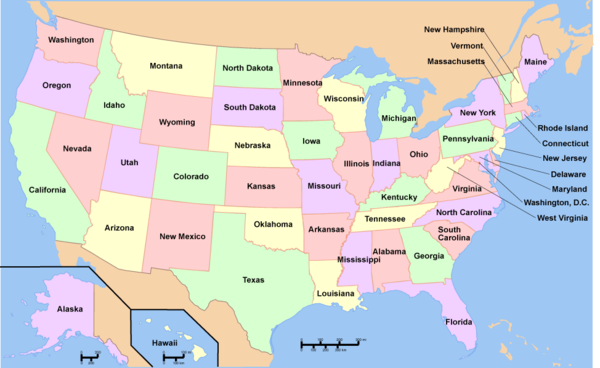Massachusetts and coal
{{#badges: CoalSwarm}}
Contents
- 1 Introduction
- 2 History
- 3 Citizen activism
- 3.1 May 15, 2013: #coalisstupid Blockades Coal Shipment to Brayton Point Coal Plant
- 3.2 April 1, 2008: Fossil Fools Day blockade of Boston Bank of America branch
- 3.3 July 10, 2008: Mountain Justice activists protest approval of Somerset coal gasification plant
- 3.4 October 7, 2008: Cambridge, MA protestors shut down Citi branch
- 3.5 October 31, 2008: Zombies descend on Boston Bank of America and Citi branches
- 3.6 November 14, 2008: Rising Tide Boston helps banks market "green" coal
- 3.7 February 5, 2009: Rising Tide Boston crashes Harvard lecture by Arch Coal CEO: Cambridge, MA
- 3.8 February 14, 2009: Day of Account Closures at Boston Bank of America branches
- 3.9 March 1, 2009: Activists rally against coal in Massachusetts
- 3.10 March 31, 2009: Lone activist shuts down Bank of America branch in Boston, MA
- 3.11 April 1, 2009: Greenpeace activists hold a "coal circus" on Boston Common in Boston, MA
- 4 NRG closes Somerset Power Generating Station; announces conversion project
- 5 Legislative issues
- 6 Coal power companies
- 7 Existing coal plants
- 8 Emissions Data
- 9 Spending on Coal Imports
- 10 Connections to Mountaintop Removal Coal Mining
- 11 Coal Combustion Waste
- 12 Major coal mines
- 13 Citizen groups
- 14 Resources
Introduction
Massachusetts had 12 coal-fired generating stations in 2005, with 1,776 MW of capacity, representing 11.3% of the state's total electric generating capacity; Massachusetts ranks 37th out of the 50 states in terms of coal-fired electric generating capacity.[1] In 2006, Massachusetts' coal-fired power plants produced 10.3 million tons of CO2, 36,000 tons of sulfur dioxide, and 9,000 tons of nitrogen oxide; coal-fired power plants were responsible for 11.8% of the state's total CO2 emissions.[2] In 2005, Massachusetts emitted 13.6 tons of CO2 per person, about 60% lower than the U.S. average.[3] In 2005, 47.6% of Massachusetts' electric generating capacity came from natural gas, 15.5% from fuel oil, and 11.5% from hydroelectric dams.[1]
There was no coal mining in Massachusetts in 2006.[4]
History
There is no history of coal mining in Massachusetts, as the state has little or no coal reserves.[5][6] The coal power industry is also quite weak in Massachusetts: a new major coal-fired power plant has not been built in the state since 1964, and there are currently no proposals to build new coal-fired power plants in Massachusetts.[1] The state government has been quite active in promoting reduction of greenhouse gases: in 2006, the state government successfully sued the federal Environmental Protection Agency in the U.S. Supreme Court in order to force the EPA to recognize that it has the authority to regulate CO2 emissions.[7]
Citizen activism
May 15, 2013: #coalisstupid Blockades Coal Shipment to Brayton Point Coal Plant
Two climate activists docked a lobster boat called the "Henry David T." at the loading dock to block a coal barge called the "Energy Enterprise" from loading the coal. [8]
April 1, 2008: Fossil Fools Day blockade of Boston Bank of America branch
On April 1, 2008, as part of the Fossil Fools International Day of Action, four activists used lockboxes to block the entrance to a Bank of America branch in Boston, in protest of BofA's investments in coal mountaintop removal mining and new coal power plant development. Others held banners and signs in support of the action, which was organized with help from Rising Tide North America and Rainforest Action Network. Police used saws to cut through the lockboxes, and arrested the four blockaders.[9][10]
July 10, 2008: Mountain Justice activists protest approval of Somerset coal gasification plant
On July 10, 2008, nearly fifty Mountain Justice Summer activists gathered in opposition the Office of Energy and Environmental Affairs' decision to dismiss Conservation Law Foundation's appeal of the state's approval for the coal gasification conversion at the Somerset generation station. Protesters donned haz-mat suits and delivering a pile of coal while displaying "global warming crime scene" caution tape on the front steps of the Office of Energy and Environmental Affairs in Boston.[11]
October 7, 2008: Cambridge, MA protestors shut down Citi branch
Students, community groups, and activists held a public rally outside Bank of America's Harvard Square branch, protesting both Bank of America's and Citi's risky investment strategies, which have contributed to the current economic crisis and are jeopardizing the global climate. The demonstrators then marched to a nearby Citi branch, where four activists wearing t-shirts reading "Not with Our Money" locked themselves to the entrance.[12] The protest was organized by Rising Tide Boston and City Life Vida Urbana.[13]
October 31, 2008: Zombies descend on Boston Bank of America and Citi branches
On Halloween, a group of zombies teamed up with Rising Tide Boston in a march to local branches of Bank of America and Citi, in protest of the banks role in mountaintop removal mining.[14]
November 14, 2008: Rising Tide Boston helps banks market "green" coal
As part of the National Coal Finance Day of Action, members of Rising Tide Boston set up outside Bank of America and Citibank branches to highlight the primary role these banks play in financing in coal power and mining. The activists handed out samples of "green coal" to imitate the coal industry's marketing pitch of "Clean Coal." According to one activist's pitch, "Although we’ve spent a lot of time and resources researching ways to make coal environmentally friendly, or ‘clean and green’, the best way we found to do it is to paint it green."[15]
February 5, 2009: Rising Tide Boston crashes Harvard lecture by Arch Coal CEO: Cambridge, MA
Seven activists from Rising Tide Boston disrupted a lecture given by Arch Coal CEO Steve Leer at Harvard University. Leer was speaking about the future of "clean coal" technology. The activists interjected information on the impacts of coal extraction, including their final question, "What gives you the right to gamble the future of civilization on a magic technology that doesn’t exist?" While Leer tried to ignore the question, two members of Rising Tide carried a banner on stage that read "The coal bubble is bursting - Clean Coal is a Dirty Lie." The lecture was funded by Bank of America, the single largest financial backer of mountaintop removal.[16]
February 14, 2009: Day of Account Closures at Boston Bank of America branches
On Valentine's Day, Rising Tide Boston and City Life/Vida Urbana called for account holders to "break up with Bank of America." The two groups hosted a day of account closures at the Copley Square and Fields Corner Bank of America branches, highlighting connections between the current financial, foreclosure, and climate crises. A street theater version of the Jerry Springer show (with guests Ivanna Goodbank, Vida Urbana, and Bo America) took place at the Copley Square branch.[17]
March 1, 2009: Activists rally against coal in Massachusetts
In solidarity with the Capital Climate Action on March 2, protests were held in Massachusetts at the Dominion's Salem Harbor and Brayton Point plants, NRG's Somerset plant, and Northeast Utilities' Mount Tom Station.[18] In Salem, about forty people rallied and speakers, such as Aviva Chomsky, were featured; the event was organized by HealthLink.[18] In Somerset, seventy-five people rallied in a park within sight of both of the town's coal-fired power plants.[18] Approximately sixty people gathered at the Mount Tom plant in Holyoke.[18]
March 31, 2009: Lone activist shuts down Bank of America branch in Boston, MA
An activist with Mannequins for Climate Justice chained himself to the doors of the Kenmore Square Bank of America just before it opened. The protester, who called himself Guy Fox, said of his actions, "Even a dummy like me can see that Bank of America’s massive loans to coal companies and support for the epidemic of foreclosures and evictions has to stop now."[19]
April 1, 2009: Greenpeace activists hold a "coal circus" on Boston Common in Boston, MA
As part of the global Fossil Fools Day campaign, about 20 Greenpeace activists staged a "coal circus" to refute the coal industry's claims that coal plants can produce energy without significant greenhouse gas emissions. The protesters wore clown suits and put up a banner that read, "The Coal Circus. It's so Clean! (April Fools.)" Greenpeace Field Organizer David Pomerantz commented, "April 1st a great day to do something fun, but nothing is more deathly serious than the idea of continuing to burn coal. Coal is killing our future."[20]
NRG closes Somerset Power Generating Station; announces conversion project
In November, 2009, NRG Energy announced that it will close the Somerset Power Generating Station on January 2, 2010. A company spokesman cited "market forces" and a "requirement that we close down or repower [by] September of 2010." NRG plans to convert the plant from burning coal to a plasma gasification process, which breaks down coal into its component parts before converting it into energy. No timetable for that conversion has been announced.[21]
Legislative issues
Coal power companies
"Clean Coal" Companies
While Massachusetts does not have any coal mines, nor are any the largest coal companies based in the state, the Boston area is a renowned technology hub and home to many energy start-up companies. At least two of the area's companies focus on coal-fired plants and "clean coal" technology:
- GreatPoint Energy of Cambridge,
- SCS Energy of Concord (building the PurGen One plant in New Jersey).
Existing coal plants
Massachusetts had 12 coal-fired generating units at six locations in 2005, with 1,776 MW of capacity - representing 11.3% of the state's total electric generating capacity.[1][22][23]
Here is a list of coal power plants in Massachusetts with capacity over 300 MW:[1][24]
| Plant Name | County | Owner | Year(s) Built | Capacity | 2007 CO2 Emissions | 2006 SO2 Emissions | SO2/MW Rank |
|---|---|---|---|---|---|---|---|
| Brayton Point | Bristol | Dominion | 1958, 1963, 1964 | 1125 MW | 6,548,000 tons | 25,776 tons | 139 |
| Salem Harbor | Essex | Dominion | 1952, 1958 | 330 MW | 2,270,000 tons | 8,616 tons | 124 |
These 2 plants represent 81.9% of Massachusetts' coal energy generating capacity, 10.1% of the state's total CO2 emissions, and 16.6% of its total SO2 emissions.[3]
For a map of existing coal plants in the state, see the bottom of this page.
Proposed Salem Harbor Station closure
On November 18, 2010, Dominion said it expects to shut the Salem Harbor coal/oil-fired power plant in Massachusetts within five to seven years "as the high cost of keeping up with ever more stringent pollution rules could make it uneconomic to keep operating the plant," a company executive said.[25][26]
Independent System Operator (ISO) New England, which operates the regional power grid, could again decide Salem Harbor is needed for "reliability" -- as the ISO has over the past couple of years. Dominion recently asked the ISO to withdraw the plant from the grid's June 2011 forward capacity auction for 2014-15. The ISO is not expected to decide on the request until 2011. Dominion reportedly wants to withdraw from the auction not because the company wants to shut the plant but because the capacity price has been coming down over the past few years. The capacity auction pays power suppliers (and demand response customers who agree to reduce usage) to remain available to maintain the long-term reliability of the grid.[25]
Drinking water contaminated with hexavalent chromium from coal may cause cancer
A report released by EarthJustice and the Sierra Club in early February 2011 stated that there are many health threats associated a toxic cancer-causing chemical found in coal ash waste called hexavalent chromium. The report specifically cited 29 sites in 17 states where the contamination was found. The information was gathered from existing EPA data on coal ash and included locations in Alabama, Arkansas, Delaware, Florida, Illinois, Indiana, Minnesota, Massachusetts, North Carolina, North Dakota, Nevada, Ohio, Oklahoma, Pennsylvania, Tennessee, Virgina and Wisconsin. In Massachusetts, the Salem Acres coal ash site in Salem and the Brayton Point Station in Somersest were reported as having high levels of chromium seeping into groundwater.[27]
As a press release about the report read:
- Hexavalent chromium first made headlines after Erin Brockovich sued Pacific Gas & Electric because of poisoned drinking water from hexavalent chromium. Now new information indicates that the chemical has readily leaked from coal ash sites across the U.S. This is likely the tip of the iceberg because most coal ash dump sites are not adequately monitored.[28]
Emissions Data
In 2007, the three top polluters in Massachusetts were coal-fired power plants. Dominion's Brayton Point plant in Somerset topped the list, having released 1,743,566 pounds of pollutants.[29] Numbers two and three were the Mount Tom plant in Holyoke (489,104 pounds) and the Salem Harbor plant in Salem (276,492 pounds), respectively.[29] Number four was Solutia, Inc. in Springfield (a manufacturer of industrial materials) and Irving Oil Terminals in Revere.[29]
Spending on Coal Imports
In May 2010, the Union of Concerned Scientists released a report titled Burning Coal, Burning Cash: Ranking the States that Import the Most Coal.[30] The report found that Massachusetts ranks third in a list state-by-state spending on international coal imports in 2008.[30] According to the report, Colombia was the largest source of coal imports into Massachusetts with $206 million worth of coal purchased from the country, accounting for 82% of the coal burned in Massachusetts.[30] The total amount of money spent on coal for Massachusetts plants was $252 million; of this amount, $41 million was spent on Kentucky coal and additional $1 million purchased Colorado coal.[30] Dominion Energy New England purchased $214 million worth of coal in 2008 for the Brayton Point Station.[31]
In 2008, sixteen U.S. states imported 25.4 million tons of coal from outside the country at the cost of $1.8 billion, an amount the equivalent of 1,700 barges over the course of a year, or over four per day.[30] These imports amounted to three percent of the coal burned in the U.S. for electricity.[30] The report noted that while coal imports into the U.S. have tripled over a ten year period ending in 2008, the country exports more coal than it imports.[30]
Alabama (with $489 million) ranks number one for state-by-state spending on international coal imports, followed by Florida (with $307 million).[30] "However," the report states, "the mantle of most dependent in this category should perhaps go to Massachusetts" because international imports account for such a high percentage of the coal imported and burned there.[30]
A quarter of the electricity (24.5%) generated in Massachusetts comes from coal.[30] Half of the electricity (49.7%) generated comes from natural gas and 13.6% comes from nuclear.[30]
The UCS report ranked states dependence on coal by six categories. Of the six categories, Massachusetts was in the top ten for only this one category ('Spending on International Coal Imports').[30] For the remaining five categories, Massachusetts had mid-level rankings:[30]
- Expenditures on Coal as Fuel for Power Plants (2008): MA ranks #25 with $252 million
- Amount of Coal Used to Fuel Power Plants, by Weight (2008): MA ranks #28 with 3,687,000 tons (total & net imports)
- Spending on Net Coal Imports per Capita (2008): MA ranks #29 with $39
- Spending on Net Coal Imports as a Share of Gross State Product (GSP) (2008): MA ranks #29 with 0.07%
- Net Coal Imports as a Share of Total State Electricity Use (2008): MA ranks #26 with 21% net imports/electricity use
Connections to Mountaintop Removal Coal Mining
The coal-fired power plants in Massachusetts are on the ISO New England grid.[32] According to iLoveMountains.org, the NRG Somerset plant was the only plant known to purchase coal from mountaintop removal mines, while the Mount Tom, Brayton Point, and Salem Harbor plants purchase coal from companies who practice mountaintop removal mining.[32]
Coal Combustion Waste
Fly Ash Disposal in Freetown, MA
In May 2001, the Massachusetts town of Freetown banned further dumping, filling or piling of fly ash within the town.[33] A secret ballot was held at a town meeting where 470 people voted in support of the ban and 337 people voted in opposition.[33] Fly ash had been dumped in the Freetown for twenty-five years previous to the ban.[33] Throughout that time, K.R. Rezendes, Inc. had brought in coal combustion waste from Somerset and Salem's power plants.[33]
Fly ash landfills in Freetown are unlined and one is located near the town aquifer.[34] Freetown's Board of Health tested the landfill and gravel trucks used for ash transportation.[34] Testing found excessive arsenic levels.[34]
Debate over the ban went on within the town for a year before being brought to a vote.[33] Voters supported the ban for reasons including concerns about fly ash leaking out of unlined pits and into groundwater and drinking water, and concerns for childrens health.[33] Reasons of opposition to the ban ranged from concern that it should be an issue addressed by the state, skepticism of safety concerns, and concern about the loss of the economic benefits.[33]
In 2007, KGI Properties LLC became interested in an old 82-acre fly ash dump owned by K.R. Rezendes in Freetown.[35][36] KGI is a real estate development company operating throughout New England; the company primarily builds and manages shopping centers.[37] Despite organized opposition, KGI developed a 450,000 square foot shopping mall named Payne's Crossing located at South Main Street and Route 24.[35]
A group of 300 local residents formed the Assonet Bay Action Committee in response to the retail development plans.[35] The group's was concerned that the fly ash pile would be disturbed during construction, causing leaks, especially because the site is located next to Northern diamondback terrapin nesting area.[35] The Northern diamondback terrapin is a protected species in the state of Massachusetts.[35] Other concerns included a great increase in traffic for the area, runoff from the parking lot, and critiques of big-box stores overall.[35]
Traffic congestion and an Environmental Impact Report (required under the state Environmental Policy Act) was one of the only issues that slowed the process.[35][36] In September 2007, Massachusetts Secretary of Environmental Affairs Ian Bowles rejected KGI's original Environmental Impact Report and traffic mitigation plans.[35] In November 2008, Bowles approved the final Environmental Impact Report.[36]
Major coal mines
There are no coal mines in Massachusetts.[38]
Citizen groups
Resources
References
- ↑ Jump up to: 1.0 1.1 1.2 1.3 1.4 Existing Electric Generating Units in the United States, 2005, Energy Information Administration, accessed April 2008. Cite error: Invalid
<ref>tag; name "EIA" defined multiple times with different content - ↑ Estimated Emissions for U.S. Electric Power Industry by State, 1990-2006, Energy Information Administration, 2007.
- ↑ Jump up to: 3.0 3.1 Massachusetts Energy Consumption Information, eRedux website, accessed June 2008.
- ↑ Coal Production and Number of Mines by State and Mine Type, Energy Information Administration, accessed June 2008.
- ↑ State Coal Profiles, Energy Information Administration, 1994. - cached copy at CoalDiver.org
- ↑ Recoverable Coal Reserves at Producing Mines, Estimated Recoverable Reserves, and Demonstrated Reserve Base by Mining Method, 2006, Energy Information Administration, 2007.
- ↑ Massachusetts et al v. Environmental Protection Agency et al, 549 U.S. 497 (2007).
- ↑ The 'Henry David T.' Blocks a Coal Tanker at Brayton Point The Nation
- ↑ "An April Fools Protest", Boston Globe, April 1, 2008.
- ↑ "Activists Blockade Bank of America to Protest Funding of Coal, Boston", Fossil Fools Day blog, April 1, 2008.
- ↑ Mountain Justice Press Release July 10, 2008, Mountain Justice website, accessed, 9/26/2008
- ↑ "Protestors Tell Citi and Bank of America: "Not With Our Money, End Your Destructive Investments’", Rainforest Action Network, September 27, 2008.
- ↑ "Protesters tell Citi and Bank of America: Not with our money, end your destructive investments", Rising Tide Boston website, accessed March 24, 2009.
- ↑ "Zombies tell Bank of America:"Coal is killing us!", Rising Tide Boston website, accessed March 24, 2009.
- ↑ "Rising Tide Boston helps big banks market 'Green Coal'," The Understory, November 17, 2008.
- ↑ "Rising Tide Boston Crashes Talk by Arch Coal CEO," Power Past Coal, February 5, 2009.
- ↑ "Rising Tide Boston and City Life/Vida Urbana organize mass account closing at Bank of America", Rising Tide Boston website, accessed March 24, 2009.
- ↑ Jump up to: 18.0 18.1 18.2 18.3 "Massachusetts rallying to stop coal!", Secure Green Future website, accessed March 23, 2009.
- ↑ "Mannequins for Climate Justice Shut Down Bank of America," Power Past Coal, March 31, 2009.
- ↑ "Clean coal? April Fools says Greenpeace," The Boston Globe, April 1, 2009.
- ↑ Marc Munroe Dion, "Somerset's NRG plant closing down," The Herald News, 11/4/09
- ↑ Environmental Integrity Project, "Dirty Kilowatts: America’s Most Polluting Power Plants", July 2007.
- ↑ Dig Deeper, Carbon Monitoring for Action database, accessed June 2008.
- ↑ Dig Deeper, Carbon Monitoring for Action database, accessed June 2008.
- ↑ Jump up to: 25.0 25.1 "Dominion to shut Mass. Salem Harbor coal/oil plant" Reuters, Nov. 18, 2010.
- ↑ "Old Plant Begins to Break Spell Over Salem, Mass." Jay Lindsay, Associated Press, November 28, 2010.
- ↑ "EPA’s Blind Spot: Hexavalent Chromium in Coal Ash" Earthjustice & Sierra Club, February 1, 2011.
- ↑ "Coal ash waste tied to cancer-causing chemicals in water supplies" Alicia Bayer, Examiner.com, February 1, 2011.
- ↑ Jump up to: 29.0 29.1 29.2 "Community-specific chemical release data available for Massachusetts- New England continues trend of lower releases to air, land, and water", Environmental Protection Agency Region 1, March 20, 2009.
- ↑ Jump up to: 30.00 30.01 30.02 30.03 30.04 30.05 30.06 30.07 30.08 30.09 30.10 30.11 30.12 Jeff Deyette and Barbara Freese, "Burning coal, burning cash: Ranking the states that import the most coal", Union of Concerned Scientists, May 18, 2010.
- ↑ "Massachusetts' dependence on imported coal", Union of Concerned Scientists website, accessed August 26, 2010.
- ↑ Jump up to: 32.0 32.1 "What's my connection?", ilovemountains.org website, Accessed March 31, 2010.
- ↑ Jump up to: 33.0 33.1 33.2 33.3 33.4 33.5 33.6 Monica Allen, "Fly ash ban passes", "South Coast Today", May 8, 2001.
- ↑ Jump up to: 34.0 34.1 34.2 Maureen Kelly, "Tighter rules in store for coal ash disposal", "Gulf of Maine Times", Winter 2004, volume 8, number 3.
- ↑ Jump up to: 35.0 35.1 35.2 35.3 35.4 35.5 35.6 35.7 Elaine Carroll, "Opponents hope traffic solution will jam up Freetown mall ", "Boston Globe", September 23, 2007.
- ↑ Jump up to: 36.0 36.1 36.2 Elaine Cushman Carroll, "Freetown development gets state OK", "Boston Globe", December 14, 2008.
- ↑ "KGI Properties, Inc." website, accessed July 30, 2010.
- ↑ Major U.S. Coal Mines, Energy Information Administration, accessed June 2008.
Maps
Existing coal plants in Massachusetts
Related SourceWatch articles
- Existing U.S. Coal Plants
- Existing U.S. Coal Mines
- US proposed coal plants (both active and cancelled)
- Coal plants cancelled in 2007
- Coal plants cancelled in 2008
- Profiles of other states (or click on the map)




